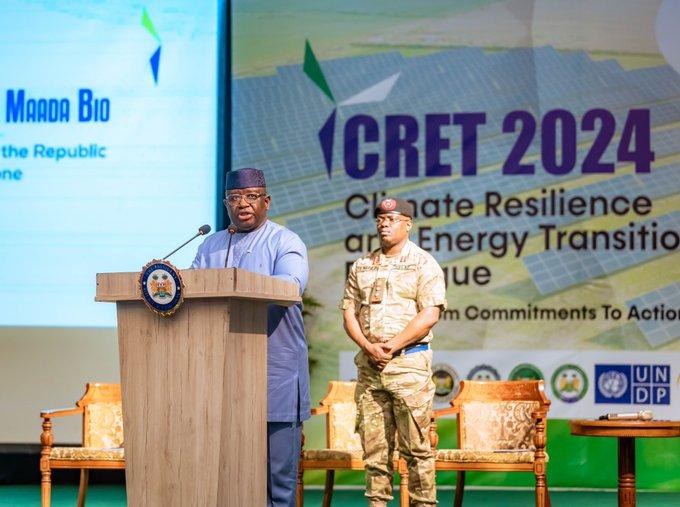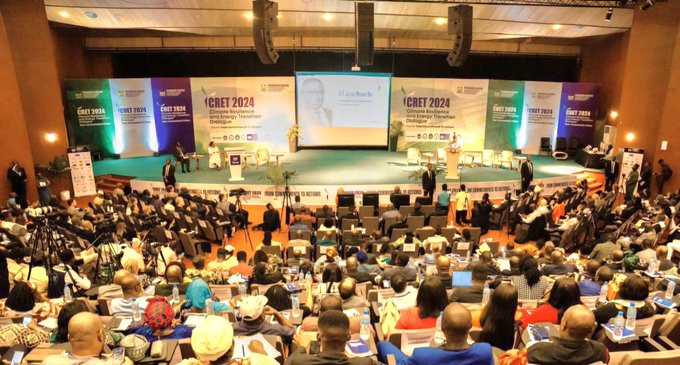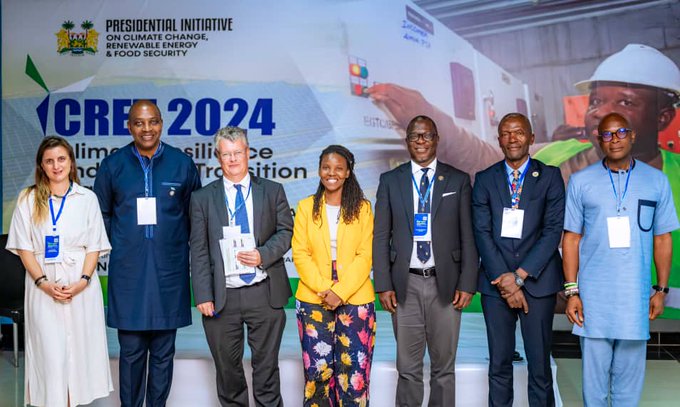The President, Dr. Julius Maada Bio, this week launched the second Climate Resilience and Energy Transition (CRET) Dialogue at the Aberdeen Freetown International Conference Center. The two-day high-level engagements aimed at advancing sustainable access to energy, promoting green growth, while also addressing the renewable energy challenges, mobilizing international support to help strategically position the country to be resilient in the face of global climate crises.

President of the Republic of Sierra Leone, Dr. Julius Maada Bio, delivers a powerful speech as he officially launches the second Climate Resilience and Energy Transition (CRET) Dialogue at the Aberdeen Freetown International Conference Center.
This innovative dialogue, organized by the Presidential Initiative on Climate Change, Renewable Energy and Food Security (PI-CREF), emphasizes the need for multisectoral collaboration to achieve the country’s green aspirations and increasing energy demands. Co-chaired by the Vice President, Dr. Mohamed Juldeh Jalloh and the Chairman of PI-CREF, Dr. Kandeh Yumkella, the two-day engagements revolved around the theme, “From Commitment to Action.”
The conference is creatively advocating for long-term energy investments, climate finance, off-grid energy solutions, and integrating resilience into the agriculture sector for sustainable food production. President Bio also acknowledged the contributions of international partners including the Sustainable Energy for All (SEforAll) and others in helping to develop Sierra Leone’s first ever Energy Transition and Investment Plan (ETIP). This plan, according to the President, reflects his government’s commitment to inclusive, affordable and sustainable energy transition.

A cross section of the conference attendees at the just concluded second Climate Resilience and Energy Transition (CRET) Dialogue at the Aberdeen Freetown International Conference Center launched by President Bio.
President said, “Sierra Leone is blessed with diverse renewable sources, but the challenge remains in transitioning these various sources into sustainable energy for both domestic and commercial use.” He described this transitioning process as “daunting and costly.”
The President is also not oblivious to the country’s vulnerability to adverse climate effects including rising sea levels, erratic rainfall, unstable weather patterns and all. He therefore highlighted the urgency of economic reforms to help mitigate the adverse effects of climate change. The President stressed the need for the transition to sustainable green energy to uplift “poor communities, protect workers, and support industries to adapt to the demands of a new energy era.”
On her part, the Deputy Minister of Health 2, Dr. Jalikatu Mustapha, knows that energy is not just about turning on a bulb; “it is about lighting the way to better health, potent medicines, safer deliveries, safer surgeries and stronger communities,” she says. In Sierra Leone, energy access in health facilities is a matter of life and death.

The Deputy Minister of Health 2, Dr. Jalikatu Mustapha, delivers an inspiring keynote address at the just concluded Climate Resilience and Energy Transition (CRET) Dialogue at the Aberdeen Freetown International Conference Center.
Access to power in health facilities is of high priority because it directly impacts on effective service delivery. Reliable energy supply to healthcare facilities keeps medical equipment running, stores supplies, and helps health workers carry out procedures especially at night.
Approximately 38% of health facilities in Sierra leone not having access to electricity, (SDI, 2018). This makes it impossible for health facilities to function optimally, putting enormous strain on service delivery and the population at greater risks. But, it also means that hospital administrators are forced to spend over 20% of their budget on fuel to keep generators working. In addition to the cost challenge, these generators are also churning out toxic hydrocarbons into the atmosphere, polluting the environment. According to the Deputy Minister, the health sector is trying to move away from this by going completely green with a renewable energy transition and ensuring that all of the country’s 1600 health facilities have solar power.

Deputy Minister of Health 2, Dr. Jalikatu Mustapha, central, poses for a group photo after delivering the keynote speech at CRET 2024.
She said; “there’s an undeniable link between health and energy. Without stable power, it’s difficult to improve health outcomes, let alone reach our Sustainable Development Goals. So again, this is not just a health problem; it’s a development issue that requires all of us to pitch in.”
The Ministry of Health has set itself the bold target of building a climate-resilient health system in all health facilities in Sierra Leone. The Deputy Minister 2, who is leading this transformative endeavor, says that at the heart of this work is a commitment to powering healthcare facilities—not just with any power, but with reliable, sustainable energy that works full time, irrespective of climatic or other disasters.
Dr. Jalikatu went on; “right now, we have nearly a thousand health facilities that urgently need stable power. Many are still running on costly, polluting diesel, while others are making do with unreliable electricity that’s as unpredictable as our rainy season is these days. We’re going to change that because quality healthcare deserves quality power.”
Under the leadership of the Minister of Health, Dr. Austin Demby, the health sector is already making significant gains in healthcare electrification. With reliable partnership between the British Foreign Commonwealth and Development Office, through their implementing partner, Sustainable Energy for All (SEforAll), six government hospitals have already been fully electrified with twenty-four-hours solar energy with eleven more to come.

A handful of international partners, including the Deputy CEO of Sustainable Energy for All (SEforAll) pose for a group photo.
By the same token, over 300 peripheral health units (PHUs) are being electrified with 60 already fully powered with solar energy all thanks to the partnership between MoH, Ministry of Energy (MoE), World Bank, USAID, SELCO and UNOPS, among others. These are more than just numbers, Dr. Jalikatu pointed out. She went on; “they’re milestones. They show us that together, we can make things happen.” She concluded that each solar panel installed is not just powering facilities; it is powering healthier, more resilient futures.

